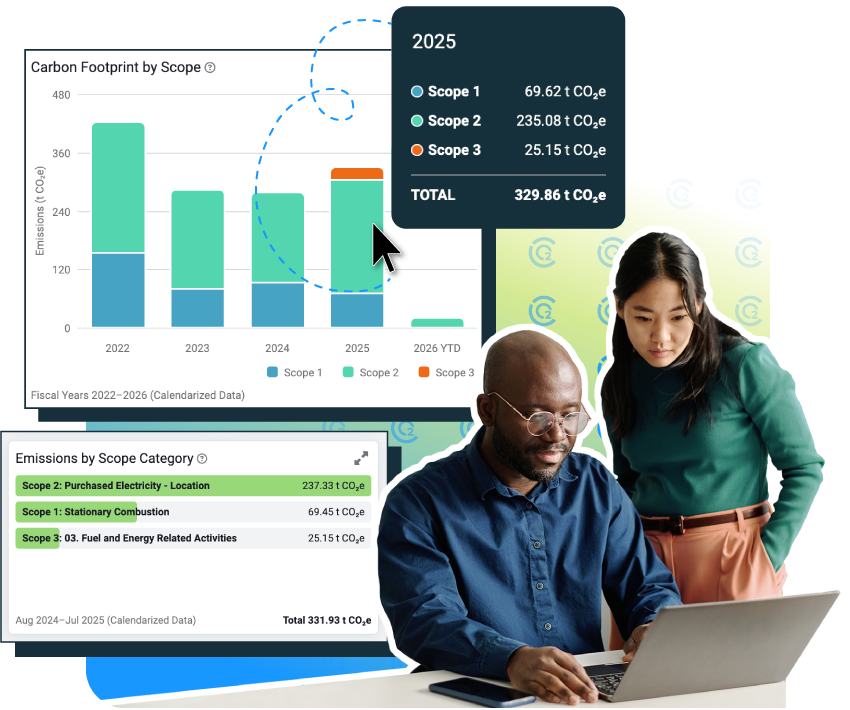As organizations push for greater efficiency, cost savings, and climate-conscious decision-making, strong energy policy and planning are no longer optional. Watch EnergyCAP’s Senior Manager ...



Carbon Hub brings your Scope 1, 2, and 3 emissions into the same centralized, verified platform as your utility bills; no spreadsheets, no duplicate entry, no silos. Just powerful utility-based carbon tracking, streamlined GHG reporting tools, and lower administrative load.
Carbon Hub supports compliance with evolving sustainability and climate regulations while saving time on carbon emissions reporting. Stay ahead of regulatory deadlines, meet stakeholder expectations with confidence, and hit internal targets without adding complexity.
Automatically convert utility and meter data into Scope 1 and 2 emissions, with intuitive tools to bring clarity to Scope 3. Built on the same trusted utility data as your billing and financial reporting, Carbon Hub makes it easy to track your carbon footprint and uncover cost-saving opportunities.
Set clear GHG targets, track reductions, and cut utility costs all in one platform. Carbon Hub makes it easy to monitor progress and turn emissions data into measurable savings.
In times of growing scrutiny and shifting expectations, sustainability managers need more than good intentions, they need hard numbers. Tie carbon reductions to measurable ROI, justify investments, and drive financial and emissions progress simultaneously.
Carbon accounting is the process of measuring, tracking, and reporting greenhouse gas (GHG) emissions from businesses, organizations, or activities. It helps quantify carbon footprints by categorizing emissions into direct (Scope 1), indirect (Scope 2), and value chain emissions (Scope 3).
Carbon accounting is important because it helps organizations measure and manage their greenhouse gas emissions, enabling them to reduce their environmental impact and meet sustainability goals. It supports regulatory compliance, enhances corporate transparency, and improves decision-making for carbon reduction strategies. It also allows businesses to participate in carbon trading, attract environmentally conscious investors, and contribute to global efforts to combat climate change.
Businesses, governments, nonprofit organizations, and individuals use carbon accounting to measure and manage their greenhouse gas emissions. Large corporations and industries use it to comply with regulations, meet sustainability goals, and report to stakeholders. Governments apply carbon accounting at national and regional levels to track emissions and develop climate policies. Consultants, environmental agencies, and third-party auditors also assist organizations in accurately assessing and verifying their carbon footprints.
Decarbonization is the process of reducing or eliminating carbon dioxide (CO₂) and other greenhouse gas emissions from energy production, transportation, and industrial processes. Decarbonization drives innovation in clean energy, strengthens energy security, and supports economic growth through green technologies while helping achieve net-zero emissions and promoting a cleaner environment.
Decarbonization is important because it helps combat climate change by reducing greenhouse gas emissions that contribute to global warming. It supports environmental sustainability, improves air quality, and enhances public health by decreasing reliance on fossil fuels. Achieving decarbonization is essential for meeting international climate targets and ensuring a livable planet for future generations.
Carbon emissions are the release of carbon dioxide (CO₂) and other greenhouse gases into the atmosphere, primarily from human activities such as burning fossil fuels, deforestation, industrial processes, and agriculture. These emissions contribute to the greenhouse effect, trapping heat and leading to global warming and climate change.
Carbon emissions are classified into three main scopes under the Greenhouse Gas (GHG) Protocol, including direct emissions from sources like vehicles and factories, as well as indirect emissions from electricity use and supply chains. Effectively managing and reducing these emissions is essential for minimizing environmental harm, enhancing air quality, and reaching global climate targets such as net-zero emissions.
Carbon emissions can be reduced by using renewable energy sources like solar and wind, improving energy efficiency in buildings and appliances, adopting sustainable transportation and reducing waste. Businesses and governments can implement policies to limit emissions, invest in carbon capture technologies, and promote eco-friendly practices.
Carbon accounting software helps reduce carbon emissions by providing organizations with advanced energy and sustainability management tools. It enables businesses, governments, and institutions to track energy consumption, monitor greenhouse gas emissions, and identify inefficiencies in energy use. Software with carbon accounting capabilities allows organizations to measure and report their emissions accurately, set reduction targets, and comply with environmental regulations.
A carbon footprint is the total amount of greenhouse gases, primarily CO₂, emitted directly and indirectly by an individual, organization, product, or activity. It includes emissions from energy use, transportation, food production, manufacturing, and waste. Measuring a carbon footprint helps identify ways to reduce environmental impact by adopting sustainable practices, improving energy efficiency, and using low-carbon alternatives.
For over 40 years, EnergyCAP has partnered with organizations to simplify energy and sustainability data management. By combining innovative tools with expert training and professional support, we empower businesses to achieve decarbonization goals efficiently and effectively.
Accurate, timely, and dependable data is key to your success. Make manual data entry a thing of the past and let us do the work for you. We capture utility bill data in any format and also capture smart meter interval data from available sources.
Our team of industry experts are here to guide you through your data journey from expert implementation to advanced consultation, to becoming an extension of your team. We’re here to help you do your best work and achieve your goals.
Whether you are new to EnergyCAP or if you just need a refresher course, we are committed to helping you and your team maximize the value from the software. We offer online or in person customized training to meet your specific needs.